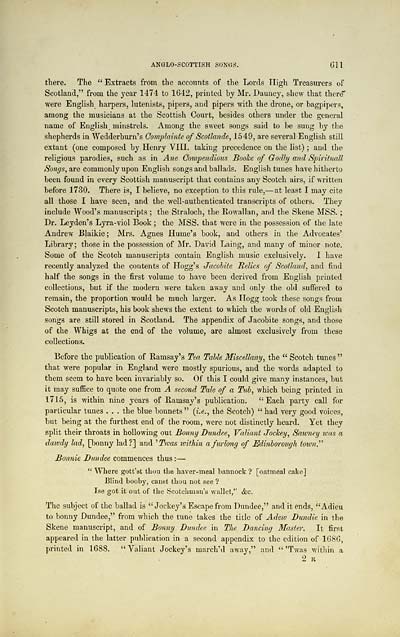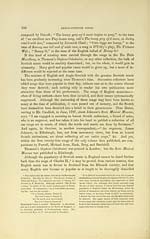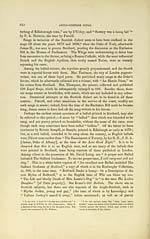Glen Collection of printed music > Printed text > Popular music of the olden time > Volume 2
(235) Page 611
Download files
Complete book:
Individual page:
Thumbnail gallery: Grid view | List view

ANGLO-SCOTTISH SONGS. 61 1
there. The " Extracts from the accounts of the Lords High Treasurers of
Scotland," from the year 1474 to 1642, printed by Mr. Dauney, shew that there"
were English harpers, lutenists, pipers, and pipers with the drone, or bagpipers,
among the musicians at the Scottish Court, besides others under the general
name of English, minstrels. Among the sweet songs said to be sung by the
shepherds in Wedderburn's Qomplainte of Scotlande, 1549, are several English still
extant (one composed by Henry VIII. taking precedence on the list) ; and the
religious parodies, such as in Ane Compendious Booke of Godly and Spirituall
Songs, are commonly upon English songs and ballads. English tunes have hitherto
been found in every Scottish manuscript that contains any Scotch airs, if written
before 1730. There is, I believe, no exception to this rule, — at least I may cite
all those I have seen, and the well-authenticated transcripts of others. They
include Wood's manuscripts ; the Straloch, the Rowallan, and the Skene MSS. ;
Dr. Leyden's Lyra-viol Book ; the MSS. that were in the possession of the late
Andrew BJaikie ; Mrs. Agnes Hume's book, and others in the Advocates'
Library; those in the possession of Mr. David Laing, and many of minor note.
Some of the Scotch manuscripts contain English music exclusively. I have
recently analyzed the contents of Hogg's Jacobite Relics of Scotland, and find
half the songs in the first volume to have been derived from English printed
collections, but if the modern were taken away and only the old suffered to
remain, the proportion would be much larger. As Hogg took these songs from
Scotch manuscripts, his book shews the extent to which the words of old English
songs are still stored in Scotland. The appendix of Jacobite songs, and those
of the Whigs at the end of the volume, are almost exclusively from these
collections.
Before the publication of Ramsay's Tea Table Miscellany, the " Scotch tunes"
that were popular in England were mostly spurious, and the words adapted to
them seem to have been invariably so. Of this I could give many instances, but
it may suffice to quote one from A second Tale of a Tub, which being printed in
1715, is within nine years of Ramsay's publication. " Each party call for
particular tunes . . . the blue bonnets" (i.e., the Scotch) " had very good voices,
but being at the furthest end of the room, were not distinctly heard. Yet they
split their throats in hollowing out Bonny Dundee, Valiant Jockey, Sawney ivas a
dawdy lad, [bonny lad?] and 'Twas within a furlong of Udinborough town,"
Bonnie Dundee commences thus : —
" Where gott'st thou tlie haver-meal bannock ? [oatmeal cake]
Blind booby, canst thou not see ?
Ise got it out of the Scotchman's wallet," &c.
The subject of the ballad is " Jockey's Escape from Dundee," and it ends, "Adieu
to bonny Dundee," from which the tune takes the title of Adew Dundie in the
Skene manuscript, and of Bonny Dundee in The Dancing Master. It first
appeared in the latter publication in a second appendix to the edition of 168G,
printed in 1688. "Valiant Jockey's march' d away," and "'Twas within a
2 R
there. The " Extracts from the accounts of the Lords High Treasurers of
Scotland," from the year 1474 to 1642, printed by Mr. Dauney, shew that there"
were English harpers, lutenists, pipers, and pipers with the drone, or bagpipers,
among the musicians at the Scottish Court, besides others under the general
name of English, minstrels. Among the sweet songs said to be sung by the
shepherds in Wedderburn's Qomplainte of Scotlande, 1549, are several English still
extant (one composed by Henry VIII. taking precedence on the list) ; and the
religious parodies, such as in Ane Compendious Booke of Godly and Spirituall
Songs, are commonly upon English songs and ballads. English tunes have hitherto
been found in every Scottish manuscript that contains any Scotch airs, if written
before 1730. There is, I believe, no exception to this rule, — at least I may cite
all those I have seen, and the well-authenticated transcripts of others. They
include Wood's manuscripts ; the Straloch, the Rowallan, and the Skene MSS. ;
Dr. Leyden's Lyra-viol Book ; the MSS. that were in the possession of the late
Andrew BJaikie ; Mrs. Agnes Hume's book, and others in the Advocates'
Library; those in the possession of Mr. David Laing, and many of minor note.
Some of the Scotch manuscripts contain English music exclusively. I have
recently analyzed the contents of Hogg's Jacobite Relics of Scotland, and find
half the songs in the first volume to have been derived from English printed
collections, but if the modern were taken away and only the old suffered to
remain, the proportion would be much larger. As Hogg took these songs from
Scotch manuscripts, his book shews the extent to which the words of old English
songs are still stored in Scotland. The appendix of Jacobite songs, and those
of the Whigs at the end of the volume, are almost exclusively from these
collections.
Before the publication of Ramsay's Tea Table Miscellany, the " Scotch tunes"
that were popular in England were mostly spurious, and the words adapted to
them seem to have been invariably so. Of this I could give many instances, but
it may suffice to quote one from A second Tale of a Tub, which being printed in
1715, is within nine years of Ramsay's publication. " Each party call for
particular tunes . . . the blue bonnets" (i.e., the Scotch) " had very good voices,
but being at the furthest end of the room, were not distinctly heard. Yet they
split their throats in hollowing out Bonny Dundee, Valiant Jockey, Sawney ivas a
dawdy lad, [bonny lad?] and 'Twas within a furlong of Udinborough town,"
Bonnie Dundee commences thus : —
" Where gott'st thou tlie haver-meal bannock ? [oatmeal cake]
Blind booby, canst thou not see ?
Ise got it out of the Scotchman's wallet," &c.
The subject of the ballad is " Jockey's Escape from Dundee," and it ends, "Adieu
to bonny Dundee," from which the tune takes the title of Adew Dundie in the
Skene manuscript, and of Bonny Dundee in The Dancing Master. It first
appeared in the latter publication in a second appendix to the edition of 168G,
printed in 1688. "Valiant Jockey's march' d away," and "'Twas within a
2 R
Set display mode to: Large image | Transcription
Images and transcriptions on this page, including medium image downloads, may be used under the Creative Commons Attribution 4.0 International Licence unless otherwise stated. ![]()
| Special collections of printed music > Glen Collection of printed music > Printed text > Popular music of the olden time > Volume 2 > (235) Page 611 |
|---|
| Permanent URL | https://digital.nls.uk/91364814 |
|---|
| Shelfmark | Glen.254a |
|---|---|
| Additional NLS resources: | |
| Attribution and copyright: |
|
| Description | Scottish songs and music of the 18th and early 19th centuries, including music for the Highland bagpipe. These are selected items from the collection of John Glen (1833 to 1904). Also includes a few manuscripts, some treatises, and other books on the subject. |
|---|
| Description | The Glen Collection and the Inglis Collection represent mainly 18th and 19th century Scottish music, including Scottish songs. The collections of Berlioz and Verdi collected by bibliographer Cecil Hopkinson contain contemporary and later editions of the works of the two composers Berlioz and Verdi. |
|---|

